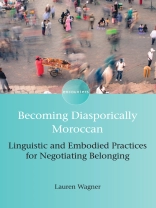Questions persist about post-migrant generations and their sense of belonging in one homeland or another. As descendants of migrants, ‘second’ and further generations often struggle to establish an unproblematic belonging in/to a resident homeland, as the place where they live and work but are often categorized as ‘outsiders’. Simultaneously, because of improving access to travel, they can also maintain a physical presence in an ancestral homeland. However, their encounters there may also problematize their sense of belonging. During their summertime visits to Morocco, the European-Moroccan participants in this ethnography repeatedly find themselves negotiating a sense of belonging in the ‘homeland’. This book analyzes how these negotiations take place in order to investigate how the categories of ‘diasporic’ and ‘Moroccan’ become shaped by the interactional encounters observed. In the setting of Morocco, where trajectories to and from Europe have colored several centuries of history, this book provides a framework to explore how migration and return become incorporated into contemporary ‘Moroccanness’.
Tabela de Conteúdo
Acknowledgements
Transcription Conventions
Introduction
Chapter 1: Pathways and Backgrounds
Chapter 2: Integrating Theory and Method
Chapter 3: Defining the Category ‘Moroccan’: Embodied Misrecognitions and Dynamics of Passing
Chapter 4: Bargaining for ‘Moroccanness’: Categorial Work on the Market
Chapter 5: A New Category? Becoming ‘Diasporically-Moroccan’
Conclusion: Assembling Diasporicness
Bibliography
Sobre o autor
Lauren Wagner is Assistant Professor in Globalisation and Development, Maastricht University, The Netherlands. She is co-convener of the Anthropology of Mobilities network, European Association of Social Anthropologists. Her research focuses on embodied practices and diasporic mobilities.












